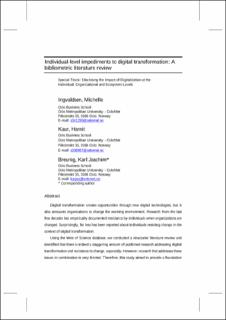Individual-level impediments to digital transformation: A bibliometric literature review
Conference object
Published version
Permanent lenke
https://hdl.handle.net/11250/2987284Utgivelsesdato
2021Metadata
Vis full innførselSamlinger
- Publikasjoner fra Cristin [3362]
- SAM - Handelshøyskolen [394]
Originalversjon
https://www.ifkad.org/event/ifkad-2021/Sammendrag
Digital transformation creates opportunities through new digital technologies, but it also pressures organizations to change the working environment. Research from the last few decades has empirically documented resistance by individuals when organizations are changed. Surprisingly, far less has been reported about individuals resisting change in the context of digital transformation. Using the Web of Science database, we conducted a structured literature review and identified that there is indeed a staggering amount of published research addressing digital transformation and resistance to change, separately. However, research that addresses these issues in combination is very limited. Therefore, this study aimed to provide a foundation for both future research and for practice concerning individual-level impediments within digital transformation processes and how these processes can be managed. Our search method found 365 articles, which were further analysed using bibliographic methods. Subsequently, 20 relevant articles were identified, and a content analysis was performed. The meticulous analysis of extant literature revealed a strong emphasis on managerial issues within the transformation process. Remarkably, very few articles explicitly focus on employees and rather address the influence of management over the employees when attempting to pursue digital transformation processes. This study identified six managerial factors that link the individual level to the organizational level in digital transformation processes: beliefs and mindsets, preparedness and strategy framework, culture, competencies, communication, and management. The core articles explain how all these factors affect the resistance to change by individuals. Additionally, we offer a conceptual model providing a foundation for further theory development and guidance for practitioners aiming for a more agile digital transformation.
